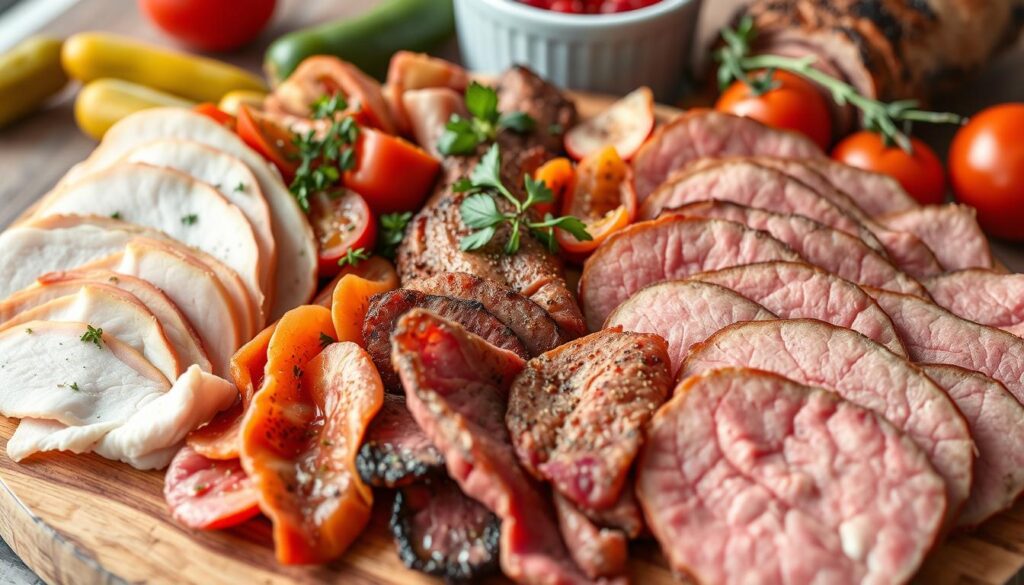As a busy parent, finding healthy, affordable lunch options is tough. Store-bought deli meats are full of preservatives and sodium. I wanted to avoid these, so I learned to make my own deli meat. It’s changed our lunches for the better, and I’m eager to share it with you.
In this guide, you’ll learn how to make tasty deli meats at home. It doesn’t matter if you’re new to cooking or experienced. You’ll find out how to make turkey, chicken, and beef cold cuts without harmful additives. Get ready to improve your family’s lunches with homemade.
Table of Contents
Understanding the Benefits of Homemade Deli Meat
Making your own deli meat at home has many advantages. It’s healthier and can save you money. Let’s look into these benefits.
Health Advantages Over Store-Bought Options
Store-bought deli meats often have too much sodium and preservatives. But, making your own lets you choose what goes into it. For example, a single slice of ham can have 362mg of sodium, which is 15% of what you should have in a day.
Homemade options like nitrate-free turkey breast are better. They offer a healthier protein choice with fewer additives.
Cost Savings and Budget Benefits
Homemade deli meat can save you up to 78% compared to store-bought. This means you can enjoy tasty flavors without spending too much. With the right meat curing and deli meat recipes, you can make top-quality artisanal meats for less.
Quality Control and Ingredient Transparency
When you make your own deli meat, you control everything. You can pick fresh, quality meats and avoid bad additives. This way, you can make sure your deli meat fits your diet and health goals.
“Homemade deli meat allows for better quality control and ingredient transparency, ensuring you know exactly what you’re consuming.”
Essential Equipment and Tools for Making Deli Meat
Making delicious homemade deli meats needs the right tools. You’ll need sharp knives and meat thermometers for success. Let’s look at what you need to turn simple meat into tasty smoked and cold cuts.
Slicing with Precision
A good serrated knife is key for slicing. Choose one that’s at least 12 inches long for big cuts. Also, a digital kitchen scale helps you measure meat accurately, saving waste and keeping flavors consistent.
Monitoring Temperatures
Keeping meat at the right temperature is vital for safety and flavor. Use a meat thermometer to check temperatures during smoking, cooking, and chilling. This ensures your meat is cooked just right and safe to eat.
Smoking for Flavor
Adding a smoker can enhance your deli meats’ taste. Whether electric, charcoal, or pellet-fueled, smokers bring a unique flavor to your homemade deli meats.
With the right tools, you can make deli meats like a pro in your kitchen. Get these essential items and impress everyone with your homemade creations.
| Item | Importance | Recommended Features |
|---|---|---|
| Serrated Knife | Precise slicing for even, uniform cuts | 12-inch blade length |
| Digital Kitchen Scale | Accurate portioning and portion control | Tare function for container weight |
| Meat Thermometer | Ensure proper internal temperatures for food safety and quality | Digital display for easy reading |
| Smoker | Add depth of flavor through smoked meats and meat preservation | Electric, charcoal, or pellet-fueled options |
Selecting the Right Cuts of Meat for Home Curing
Creating your own deli meats at home starts with the right meat cuts. You might want to make turkey, chicken, or roast beef. The goal is to pick cuts that are both high-quality and full of flavor.
Best Cuts for Turkey Deli Meat
For the best turkey deli meat, use boneless, skinless turkey breasts. These lean cuts are perfect for curing and seasoning. They ensure your meat is tender and juicy.
Choosing Chicken Breasts for Cold Cuts
Whole chicken breasts are ideal for chicken deli meats. Their even thickness makes for consistent slices. Opt for organic or free-range chicken for better flavor.
Premium Beef Selections for Roast Beef
For delicious homemade roast beef, choose tender and flavorful beef cuts. Top round, eye of round, and sirloin tip are great options. They will taste amazing when cured and prepared right.
Remember, the quality of your home curing and dehydration matters a lot. It affects the taste and texture of your homemade deli meats. With the right cuts and attention to detail, you can make cold cuts as good as those in restaurants.
Brining and Seasoning Techniques
Making the perfect homemade deli meat begins with brining and seasoning. Brining keeps your meat moist and brings out its natural flavors. The right seasoning can make your deli even better.
To make a simple brine, mix 8 cups of water, 1/4 cup of salt, and 3 tablespoons of sugar. Put your turkey or chicken in the brine for 4-8 hours. This keeps your deli meat juicy and full of flavor.
After brining, try different seasoning rubs. Mix paprika, garlic powder, onion powder, and your favorite herbs and spices. You can also try honey mustard, maple glaze, or teriyaki for your cured meats.
| Brine Duration Guidelines | Recommended Salt-to-Water Ratio |
|---|---|
| Whole Chicken: 4-6 hours Whole Turkey: 24-48 hours Pork Chops: 6-12 hours Seafood: 30 mins – 2 hours | 1 cup salt per 1 gallon water 1 tablespoon kosher salt per 1 cup water |
Brining and seasoning are key to making delicious homemade deli meat. Try different flavors to find the perfect mix for your cured meats.

Understanding the Art of Homemade Deli Meat Preparation
Making homemade deli meats needs careful attention to temperature and cooking methods. Keeping the right temperatures is key for safety and flavor. Always cook your charcuterie or meat curing to at least 165°F (74°C) to kill bacteria.
Temperature Control Guidelines
Success in making deli meats comes from precise temperature control. Cook the meats in an oven or smoker at 200°F to 350°F (93°C to 177°C). Always check the meat’s internal temperature to hit the 165°F (74°C) mark.
Proper Cooking Methods
For the best taste, mix cooking techniques. Smoking adds complex flavors, while oven-roasting gives a traditional texture. Play with temperatures and times to match your taste and meat type.
Safety Considerations
Food safety is crucial when making deli meats. Clean all surfaces and utensils well. Cool cooked meats completely before slicing to stop bacterial growth.
Mastering temperature control, cooking methods, and safety can make your homemade deli meats a hit. With care, you can make your sandwiches better and enjoy your own charcuterie and meat curing creations.
| Meat | Protein (per 100g) | Fat (per 100g) | Sodium (per 100g) |
|---|---|---|---|
| Ham | 18g | 5g | 1200mg |
| Turkey Breast | 22g | 1g | 800mg |
| Salami | 18g | 30g | 1800mg |
| Bologna | 14g | 25g | 1100mg |
Mastering the Smoking and Curing Process
Turning your homemade deli meats into a masterpiece is an art. The smoking and curing process is key. It adds that special deli-style flavor you love.
Try different wood chips like apple, cherry, or hickory to enhance flavor. Smoke turkey or chicken at 225°F until it’s just right. Or, roast meats in the oven with herbs and spices for a simpler method.
Curing changes the meat’s texture and taste. Explore various curing methods like wet brines or dry rubs. Patience and detail are crucial to perfecting curing.

Creating your own deli-style meats at home is rewarding. Whether it’s roast beef or honey-baked ham, you’ll impress everyone. With practice, you’ll master smoked meats and meat preservation.
Professional Slicing and Storage Methods
To get perfect deli-style slices at home, it’s all about technique. You don’t need a meat slicer to do it. With the right knife and practice, you can make slices as good as those from a deli.
Proper Slicing Techniques
Start with a sharp knife and slightly frozen meat. This makes slicing easier and results in thin, even slices. Always slice against the meat’s grain for the best texture.
Keep your fingers curled under and use a stable cutting board. This ensures safe and controlled slicing. Thin slices are not only better looking but also taste better and cook evenly.
Adjust the slice thickness based on the meat type and your dish. Thinner slices are great for quick-cooking dishes, while thicker slices are better for roasting or grilling.
Storage Solutions for Extended Shelf Life
After slicing, proper storage is key to keeping your deli meats fresh. Use airtight containers or freezer-safe bags. Separate layers with parchment paper to prevent sticking.
Refrigerate for up to 5 days or freeze for up to 3 months. This way, you can enjoy your creations for longer.
Vacuum sealing is another great way to keep your cold cuts fresh. It locks in flavor and prevents freezer burn. This allows you to store the meat for weeks in the fridge or longer in the freezer.
Whether you slice and store by hand or with a meat slicer, keep the right temperature and packaging. This ensures your homemade deli meats stay fresh and delicious for as long as possible.
Creative Ways to Use Your Homemade Deli Meat
Take your cooking to the next level by using your homemade artisanal meats and dehydrated meats in new ways. Go beyond the usual sandwich. Let your creativity flow and try these fresh ideas to enjoy your homemade deli meats.
- Salad Toppers: Add sliced roast beef, turkey, or ham to your favorite salads for a protein-packed crunch. Try pairing them with crisp greens, juicy tomatoes, and tangy vinaigrette for a refreshing meal.
- Wrap It Up: Wrap your homemade deli meats in whole-wheat tortillas or lettuce leaves, along with fresh veggies and creamy spreads, for a delightful lunch or snack on the go.
- Frittata Fillings: Elevate your breakfast frittata by incorporating diced or crumbled deli meats, such as spicy salami or smoky ham, along with seasonal vegetables and cheeses.
- Stir-Fry Sensation: Slice your artisanal meats thinly and stir-fry them with crisp vegetables, aromatic herbs, and a flavorful sauce for a quick and satisfying dinner.
For a visually appealing and versatile option, create an artisanal meat and cheese platter. Arrange thin slices of your homemade deli meats alongside a selection of gourmet cheeses, olives, pickles, and crusty bread or crackers. This makes for a delightful appetizer or a centerpiece for your next gathering.
Try unique recipe ideas, like turkey and quinoa-stuffed bell peppers or chicken and pesto zucchini noodle bowls. These ideas showcase your dehydrated meats in a new light. The possibilities are endless with homemade deli meats.
Embrace the art of crafting your own deli meats and let your culinary creativity shine. From vibrant salads to satisfying stir-fries, the opportunities to elevate your meals with these handmade treasures are truly endless.
Troubleshooting Common Issues
Starting your homemade deli meat journey can come with a few bumps. But, with some troubleshooting and tweaks, you can get it right. One common problem is meat that’s too salty. To fix this, just adjust your brine levels carefully.
Keeping your meat from drying out is also key. Watch your cooking temperatures closely. This helps your meat stay juicy and tender.
Slicing can be tricky too. But, chilling your meat well before cutting helps a lot. Try different seasonings and cooking ways to find the best taste and texture in your deli meat. With patience and practice, you’ll soon be a pro at meat curing.
When facing issues, think of them as challenges to solve. Watch your process closely and tweak as needed. This way, you’ll make delicious homemade deli meats that are as good as store-bought ones. Enjoy the process of creating your own tasty dishes.
FAQ
What are the benefits of making your own deli meat at home?
What essential equipment and tools are needed for making deli meat at home?
What are the best cuts of meat to use for homemade deli meat?
How do you brine and season homemade deli meats?
What are the proper cooking methods for homemade deli meats?
How do you properly slice and store homemade deli meats?
How can you troubleshoot common issues with homemade deli meats?
Source Links
- DIY Homemade Lunch Meat – Make Paper Thin Slices! (+ Video) – https://dontwastethecrumbs.com/diy-homemade-lunch-meat/
- Turkey Lunch Meat Recipe – Easy Homemade Deli Meat – https://www.thefromscratchfarmhouse.com/easy-homemade-turkey-breast-deli-lunch-meat-recipe/
- Healthiest Lunch Meat: 5 Deli Meat Alternatives – https://discover.grasslandbeef.com/blog/healthiest-lunch-meat/
- Homemade Deli-style Roast Beef: Temperature Tips for Sandwich Meats – https://blog.thermoworks.com/homemade-deli-style-roast-beef/
- What Makes Deli Meat “Deli,” Exactly? Dietitians Dish – https://www.bhg.com/what-is-deli-meat-8703368
- Deli Equipment and Supplies List – https://www.webstaurantstore.com/guide/1141/deli-equipment-and-supplies-list.html?srsltid=AfmBOopuidLPNMKbyIjfaRMzoxSOrEbjx5z3JEEpscW4YpWKpwMGzqmY
- 49 Quick Ways to Use Up a Package of Deli Meat – https://www.tasteofhome.com/collection/deli-meat-recipes/?srsltid=AfmBOopnq_kVoddfWoN-WZfJZiBuvOgi0xlSsxLguytD9cT_1OHJoWw4
- Deli Roast Beef – https://www.sipandfeast.com/deli-roast-beef/
- Making Your Own Deli Meat At Home Is Easier Than You’d Think – The Daily Meal – https://www.thedailymeal.com/1500792/how-to-make-homemade-deli-meat/
- Deli Ham… From the Comfort of Your Home! – https://www.instructables.com/Deli-Ham-From-the-Comfort-of-Your-Home/
- How to Cure Meat – https://www.webstaurantstore.com/article/258/how-to-cure-meat.html?srsltid=AfmBOopOip68SoAxq-NpXZSSYi6D_Zl3JAyzTeneaAJ2dJfXyWMzr5cj
- Elevating Flavor and Moisture in Your Meats – https://www.markys.com/blog/the-art-of-brining-elevating-flavor-and-moisture-in-your-meats?srsltid=AfmBOope8pY4M3WXprMxRNdPnmNL1NNCp_0DnmgGUJVjt_GBalIpHXKS
- How to Brine Practically Any Meat – https://www.tasteofhome.com/article/this-is-everything-you-need-to-know-about-brine/?srsltid=AfmBOopO7B8IfjNEbLreXLi3dI95D1jcBsHAvSxq6N5Xp_QaDg_RsXgl
- Mastering the Art of Homemade Cold Cuts: Expert Guide and Recipes – https://discover.texasrealfood.com/deli-dyi/the-art-of-making-homemade-cold-cuts
- A Guide to Deli Meats: From Origins to Healthy Choices – FitCoding – https://fitcoding.com/a-guide-to-deli-meats-from-origins-to-healthy-choices/
- An Expert’s Advice On Making Any Lunch Meat Sandwich Better – https://www.yahoo.com/lifestyle/experts-advice-making-lunch-meat-184018218.html
- How to Make Homemade Deli Meat | Easy Recipes & Tips – https://www.quickfarmrecipes.com/homemade-deli-meat-easy-recipes-and-tips/
- Easy Smoked Pastrami – https://girlcarnivore.com/smoked-steamed-homemade-pastrami/
- Mastering the Art of Food Smoking: Techniques and Tips – https://protech-ab.se/en/mastering-the-art-of-food-smoking-techniques-and-tips/
- How to make homemade deli meat – https://www.yahoo.com/lifestyle/homemade-deli-meat-190621019.html
- How to Get Thin Cuts Without a Commercial Meat Slicer – https://www.cityfoodequipment.com/blogs/learning-center/how-to-get-thin-cuts-without-a-commercial-meat-slicer
- How to store cold cuts in the refrigerator? | expondo.co.uk – https://www.expondo.co.uk/inspirations/how-to-store-cold-cuts/
- 49 Quick Ways to Use Up a Package of Deli Meat – https://www.tasteofhome.com/collection/deli-meat-recipes/?srsltid=AfmBOopNmFB8I0otO5x0mwjZATdizVo49H-EH4yGxqbq4LpKIhc-xjfN
- 10 Creative Meat Slicer Recipes – https://sliced2go.com/10-creative-meat-slicer-recipes/
- Is my deli sandwich going to kill me? – https://www.vox.com/even-better/379347/listeria-boars-head-cold-cuts-deli-meats-cancer
- Deli Meat Recalled Nationwide Due to Listeria Outbreak – https://www.healthline.com/health-news/listeria-outbreak-deli-meat-recall

